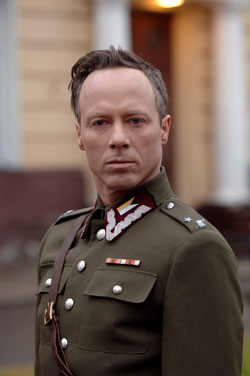 Los Angeles, California: palm trees, sunshine, Hollywood. It’s not the first place that comes to mind for a sold-out movie screening about a Polish officer who is the only known person in the world to voluntarily become imprisoned in Auschwitz. But since 2006, the City of Angels has held regular screenings for packed houses of The Death of Captain Pilecki, a television theatre drama filmed in Poland.
Los Angeles, California: palm trees, sunshine, Hollywood. It’s not the first place that comes to mind for a sold-out movie screening about a Polish officer who is the only known person in the world to voluntarily become imprisoned in Auschwitz. But since 2006, the City of Angels has held regular screenings for packed houses of The Death of Captain Pilecki, a television theatre drama filmed in Poland.
The film tells the dramatic story of Witold Pilecki, who in September 1940 accepted a mission to get himself arrested and end up in Auschwitz so that he could gather firsthand information on what was occurring there. At that time, there were few facts about the notorious death camp – just whispers. To get those facts, Polish officers chose 38-year-old, decorated cavalry captain Pilecki.
Completed in just ten days on a shoestring budget, the film made its U.S. premiere in May 2006 and has garnered critical acclaim and awards. Its star, LA-based actor Marek Probosz, who’s received not just awards but medals for his work on the film, spoke with Justine Jablonska about how playing Witold Pilecki changed his life.
Why was it important that Witold Pilecki’s story be told, and that you help tell it?
It’s a once-in-a-lifetime opportunity to play a hero like Witold Pilecki, one of the greatest people who ever lived.
We need heroes. We watch fictional stories with “heroes” like 007 and Iron Man. Witold Pilecki overrides them all.
He’s a true hero who lived not that long ago: the only known man in history who went to Auschwitz knowingly and stayed there for three years with the idea of creating an underground and liberating Auschwitz from the inside, letting the world know about the atrocities happening there, and bringing hope that someone cares, is doing something about the horrors of that hellish place.
To get the offer was an honor. I didn’t know that much about Pilecki. Once I read the script, I started digging into all kinds of information.
I’ve played characters who are not alive anymore. You have to imagine them. With Pilecki, you have photographs. You have paintings – he was also a painter, a poet. You have original letters. I met with his daughter.
There are certain characters that you don’t play, you have to become them. Playing Witold Pilecki, I changed on a personal level. I have a feeling I am much better man since I have played him.
I worked on the film in 2005, and in 2006 the movie premiered – not in Poland, but in Los Angeles, on Sunset Boulevard. It was sold out. People were shocked, uplifted after seeing the film.
Since the premiere, I have traveled with the movie all over the world – London, Stockholm, DC. I tell everyone about this man, his ideas, his deeds.
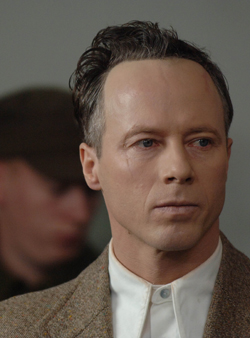 How were your background and family history helpful in preparing for the role of Pilecki?
How were your background and family history helpful in preparing for the role of Pilecki?
I was lucky to grow up in a family with a long tradition of fighting for freedom. My grandfather Jerzy Probosz was awarded by the Academy of Polish Literature in 1938, one year before WWII started, for his poetry, essays and plays.
In 1939, he was one of the first to be arrested and taken to Dachau concentration camp in Germany. He was executed in 1942, so stories of sacrificing your life for others – I grew up with that. That wasn’t that hard to relate for me, on an emotional level.
But also, I think you have to put yourself into the people’s shoes. I went to Auschwitz, I went to Dachau. I talked to people. One of my best friends in LA was in five concentration camps. He told me many, many stories, showed me the number on his forearm.
The stories are beyond description. You feel you have an obligation to pass on that legacy. Soon, the next generation won’t know what we’re talking about – they’ll think this is another Iron Man or a made-up story.
Pilecki was a very spiritual man. That helped him a lot. Thomas à Kempis wrote a book, mentioned in our movie, about how to imitate Christ [The Imitation of Christ]. That was the book that Pilecki read and asked his wife to pass on to their kids, to teach them from this book, because this book helped him on a spiritual level. They could only kill his body. But they could not triumph over his spirit.
My grandfather, when he was taken by Nazis to the camp, he wrote a few words to his friends on a piece of paper. It’s my motto in life.
Życzę Ci serca mocy
Abyś codzien i w nocy wytrwał, wytrwał, wytrwał
Chocbyś miał ziemskie ciało w proch spalić
Musisz ducha ocalić
Be of strong heart
Endure, endure, endure each day, each night
Though your earthly body may burn to ashes
Save your soul
He wrote it while they were dragging him to the train, to the camp. It was his last outburst of freedom.
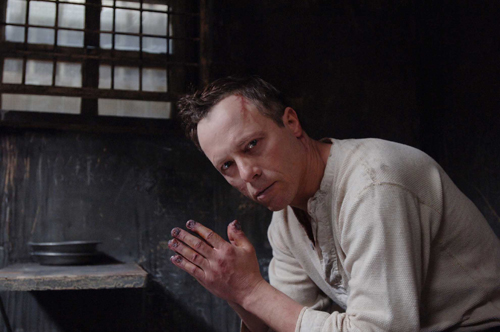 What about people who weren’t raised with a background like yours? How can they understand Pilecki’s story and the depth of his sacrifice? There’s physical anguish, but also emotional: he’s branded a traitor of Poland.
What about people who weren’t raised with a background like yours? How can they understand Pilecki’s story and the depth of his sacrifice? There’s physical anguish, but also emotional: he’s branded a traitor of Poland.
Pilecki, they killed him, but his ideas won. Poland is a free nation. His sacrifice is not for nothing. The communists tried to erase him from history, but didn’t succeed.
The director, Ryszard Bugajski, thought people wouldn’t understand it in America. When we had a screening, he was very skeptical. Not only was it a sold-out movie, but the discussion after the screening lasted a couple of hours.
The movie has been shown in Los Angeles every single year since then, at least ten times. This year, Pilecki was shown at the George Lucas Theater at USC – it was a packed audience, and this was its 11th screening – and in Orange County March 24.
The need for a true hero, an altruistic man, is always there. When you speak from the heart to the heart, it opens like it’s been struck by lightning. Your enthusiasm, passion break through a foreign language, foreign culture.
We all have the same needs. We are hungry, we love, we hate, we like to be happy, we are all searching for something to uplift us. This is this kind of story.
Even though it’s such a tragic story? Pilecki is tortured, called a traitor, killed.
Of course. Everyone around Pilecki – all his killers – is trapped. They are nervous, upset. They have their own nightmares that come from a dark place. They are not people who live in peace, who are happy.
Pilecki is happy till the end. He knows he has to say goodbye to his wife, his kids, and that’s very sad. But he says, “I had a mission and I had to do it.”
Sometimes you have to sacrifice everything you have for the future. Native American Indians live for the seventh generation to come. They treat the earth in a way the seventh generation will benefit.
Who are your audiences? Are they primarily Polish, Polish-American?
In L.A., they are American. In 2010, I was contacted by a man from NPR who put together a piece for “All Things Considered” [The Man Who Sneaked into Auschwitz]. He wrote to me later that it was the most successful program of the year. He was an American who read about Pilecki in English on the internet. There was no Pole who told him to do this.
When the movie travels around, sometimes there are Poles but other times there’s no one Polish in the audience at all.
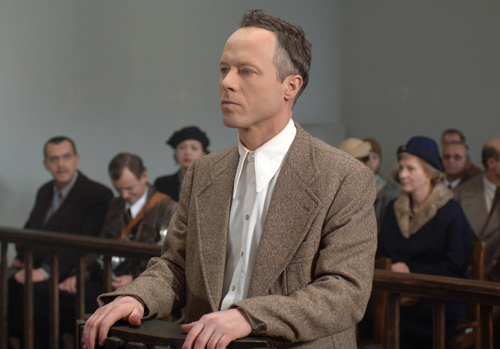 Let’s talk about your acting in the film. There are two types of scenes – in the court and in the cell.
Let’s talk about your acting in the film. There are two types of scenes – in the court and in the cell.
The hardest scene to play was when my wife is saying goodbye. Having two kids and a wife myself, it was very close to my own heart. I couldn’t stop crying in this scene. The director didn’t want me to cry there. He said Pilecki should be strong when his wife comes to him for the last time. To leave her with that strength, that his life wasn’t wasted. We had at least eight takes. Every take there was a moment where I couldn’t hold it back. So we did it again and again and again.
My metamorphosis into Pilecki was so total that a man from Poland’s Institute of National Remembrance (IPN) who helped us get all the documents from Pilecki’s trial told the director, “Where did you find him? I studied Pilecki, I know him. This is Pilecki.” The director introduced me and said, “I got him from Hollywood, of course!”
It was great to hear this kind of feedback. [During filming] I was meditating as I was sitting in Pilecki’s cell in Rakowiecka [Prison]. I was deeply physically and emotionally immersed in the part. I didn’t want to make one false move when I portrayed him.
What about the court scenes? That’s a different type of challenge. He’s in front of communist officers of the new Poland who label him a traitor.
It was like playing Hamlet. Because Hamlet sticks to his plan. Pilecki knows it’s a show trial. He has his own monologue in the court, between him, a few of his colleagues who are also accused, and God, [about] the ideal he believes in: a free Poland, a free humanity, against violence and dictatorship.
I treated the court scenes almost like a prayer, like a monologue with God, while being surrounded by evil characters. How do you keep your inner soul intact? It was like being surrounded by sharks who are very hungry, and you are all alone on the waves.
Is that what Pilecki did? To keep his soul intact?
He spoke the truth. He never let anyone intimidate or shut him down. He spoke the truth until the end. That’s why his executioners were so upset that they could not break his spirit. They tortured him, they threatened his kids, his wife, they proposed that he collaborate with him. But he didn’t. He claimed his truth that he believed in, that he was taught by his parents and grandparents.
I spoke with many people who knew him, and they all said the same thing – you don’t meet people like Pilecki, just above and beyond anybody they ever met.
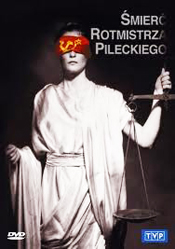 So in your travels and talks about Pilecki you’re really continuing his legacy.
So in your travels and talks about Pilecki you’re really continuing his legacy.
I am. I feel like I am an ambassador of his. He changed me.
The director wrote the screenplay about Pilecki eight years prior to making this movie. For eight years no one in Poland was interested to read the script or do anything about it.
An article [was published] in Rzeczpospolita asking why we repeat fake stories in a democratic Poland like “Czterej Pancerni,” which fake our history. Why don’t we talk about true heroes like Witold Pilecki in free Poland?
[Ed. note: “Czterej Pancerni,” was a 1966-1970 Polish TV series featuring the fictionalized adventures of a Polish WWII tank crew. Filled with pro-Soviet and pro-Russian propaganda, one of its main themes was the friendship between Polish and Soviet soldiers – in reality the latter slaughtered millions of Poles, both military and civilians.]
Ryszard Bugajski read that article and wrote to the newspaper saying that for eight years now he’s had a script, he’s knocked on all the doors, and everybody said they were not interested.
The new head of Polish Television Theatre read that newspaper and found out about the Pilecki screenplay. He asked Bugajski to send him the script.
We were supposed to make the film in just six days for $100,000. Which is impossible. You can make one TV episode for that. Bugajski said, no, I’m not going to murder Pilecki again, I’m not making the movie this way. There was a big scandal and we had to postpone.
Three-four months later, the head of PTT decided to give us $250,000 and ten days. So we did it in ten days. A movie usually has 24-30 shooting days. Here we were stuck with ten. And $250,000 – which, even a TV movie is made for $1,000,000 in Poland.
But everybody who worked on this project was probably inspired by Pilecki and driven by what he’d done, and we succeeded in making this film. That’s a very important piece of the puzzle, because it wasn’t easy to deliver that baby to the world. And now that baby lives on and on.
Because it was made under the category of TV Theater, the film didn’t go to Polish film festivals – it wasn’t considered a movie. It never had a chance to go to any big, international film festivals, couldn’t be submitted as Poland’s entry for the Academy Awards.
You cannot suppress Pilecki. The story is out there, and maybe somebody somewhere will make a huge epic movie like about Gandhi. That type of hero deserves an epic movie.
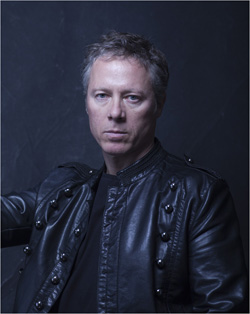 What other projects are you working on?
What other projects are you working on?
I just finished a movie with Ryszard Bugajski, “Closed Circuit.” I played the head of the National Polish Television in it. It’s based on a true story.
I was in an ABC TV series called “Scandal.” It will be shown in April.
I’m directing “The madman and the nun” by Stanislaw Witkieiwicz at UCLA. I am also preparing to direct my second feature in the United States.
And there’s a project in Poland I was asked to direct, which will start in 2013, called “Auschwitz ’42.” It’s based on a true story about four prisoners, Poles, who escaped in the uniforms of SS officers in the car of the commander of Auschwitz. It’s the only escape from Auschwitz made this way, and it’s the only escape for which Poles were not persecuted because the headquarters in Berlin were so upset about this shame on the whole German army. Kazimierz Piechowski, who was one of the people who escaped, is still alive. CR
Imagery:
Stills from The Death of Captain Pilecki courtesy of Marek Probosz
Photo of Marek Probosz by Albert Golembiowski
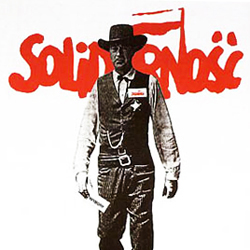
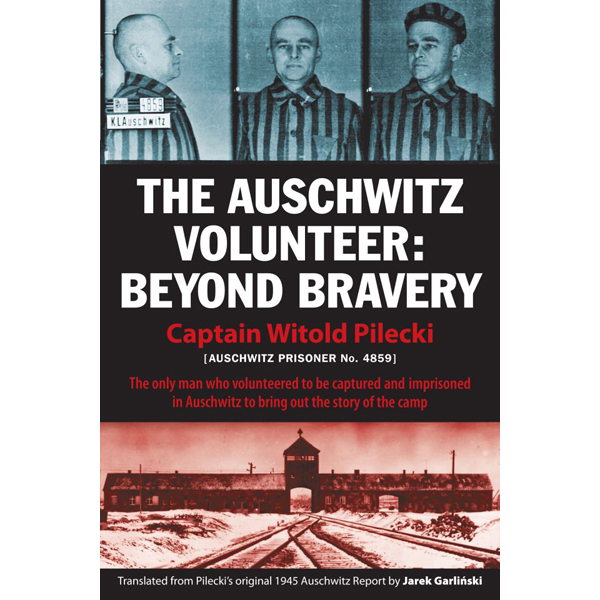
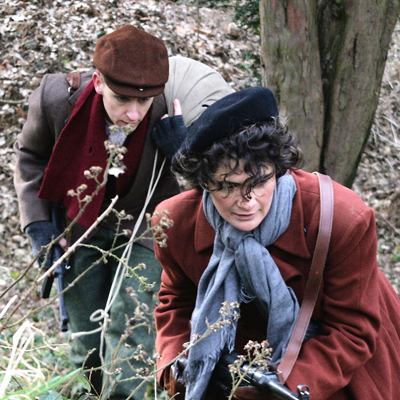

Thank you for posting this interview. Very informative and deep….I would like to see this movie but I don’t live in Hollywood, is there a way that I can purchase this movie?…..thank you?
Hello and thanks for your comment! I’ll do some sleuthing to see whether the film, “The Death of Captain Pilecki,” is available for purchase.
With regards to purchasing the film in the U.S., Quo Vadis Bookstore in Chicago has the film for sale on their website: http://www.quovadisbooks.net/dramat-i-obyczajowy/3498-smierc-rotmistrza-pileckiego.html
I called and they said the film *does* have English subtitles, however, it’s recorded in a European system PAL, so you’d need to watch it on your computer.
If I find other bookstores that carry it for sale, I’ll post that info here.
I Thank you, thank you every one of you ,who make the possibility for all of us to see -The truth and the light in the tunnel of manifestation of love to win against all odds . Got bless You.love Rysia from Los Angeles
5/6/2015
thanks for my article…